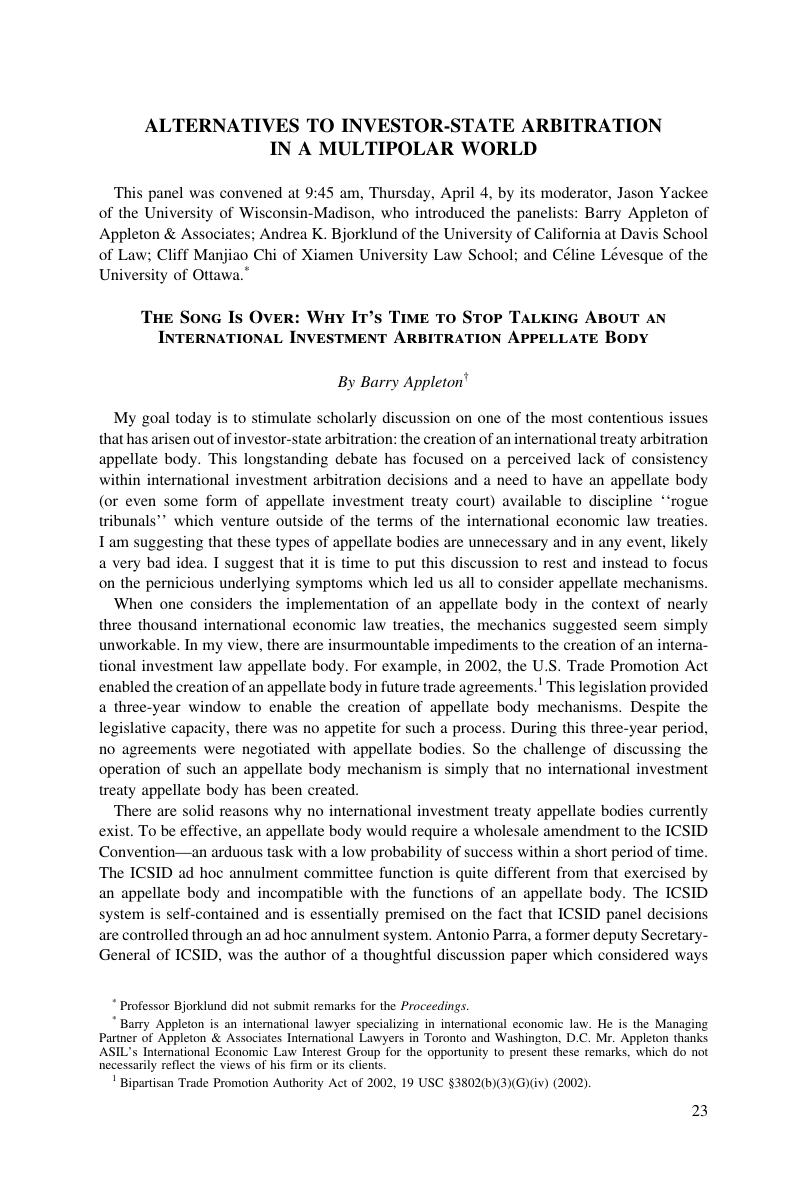Article contents
The Song Is Over: Why It’s Time to Stop Talking About an International Investment Arbitration Appellate Body
Published online by Cambridge University Press: 20 January 2017
Abstract

- Type
- Alternatives to Investor-State Arbitration in a Multipolar World
- Information
- Copyright
- Copyright © American Society of International Law 2014
References
* Professor Bjorklund did not submit remarks for the Proceedings.
1 Bipartisan Trade Promotion Authority Act of 2002, 19 USC §3802(b)(3)(G)(iv) (2002).
2 Antonio R. Parra, Possible Improvements of the Framework for ICSID Arbitration, ICSID Secretariat Discussion Paper, Oct. 22, 2004.
3 See the discussion on this topic in id., annex.
4 I am indebted to comments on these remarks from Professor Robert Howse from the Faculty of Law at New York University who points out that the state parties involved in an ICSID dispute (that is, the respondent state and state of the investor) could enter into a specific agreement to permit an appellate body to operate in the ICSID dispute without the need for an amendment to the ICSID Convention. In such a circumstance, the rules of international law require a demonstration that the ICSID Convention does not contain a lex specialis that would otherwise preclude recourse to Article 41 of the Vienna Convention. Article 41 addresses inter se amendments to multilateral treaties. Any modification to permit an appellate body process would have to ensure that the change was not to the detriment of other state parties. All modifications would need to be notified in advance to all treaty parties, and the modification could not otherwise be incompatible with the fundamental purpose of treaty. Such a process has not been followed by a party, and thus the response from an affected claimant has also not been considered in this approach.
5 The WTO’s Dispute Settlement Understanding does specify that WTO panelists need to be qualified. But this requirement has not been spelled out in a meaningful way that could provide guidelines for appointments. The resource constraints and tight timeframes for the WTO Appellate Body effectively make it impossible for the WTO Appellate Body to compensate for errors of competency and professionalism which occur at the panel level.
6 It is important to make clear that there are many qualified and experienced international economic law arbitrators who sit on investor-state arbitration tribunals, but a requirement for demonstrated knowledge of the rules of international law is simply not a prerequisite for appointment to a tribunal. This results in circumstances where there can be international investment treaty arbitration panels without any member having demonstrated knowledge of international economic law. This is a practical and identifiable way to be able to deal with the public policy concerns which have resulted in a call for an appellate body solution. My proposal is that scholars, arbitrators, arbitration institutions, and international economic law lawyers all have a vested interest in enhancing international economic law—and that ensuring professionalism and competency as a fundamental requirement of the system is a practical way to be able to address the issues of potential inconsistency and incorrectness in tribunal decisions.
- 1
- Cited by


